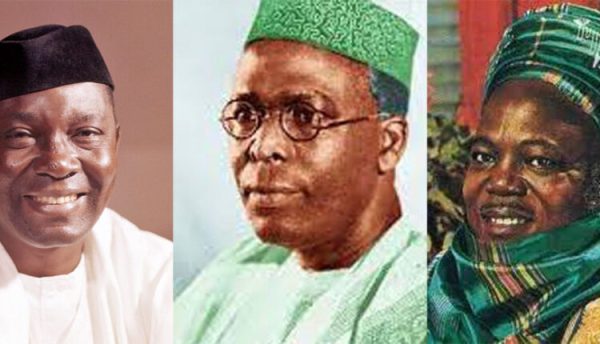Nigeria at 63: Five facts you should know about Africa’s most populous nation

Nationalists at the forefront of Nigeria’s independence
On 1st October 1960, Nigeria gained freedom from colonial rule becoming an independent nation, having the sovereignty that it desired with the enormous efforts of Tafawa Balewa, Nnamdi Azikiwe, Obafemi Awolowo, Ahmadu Bello, Anthony Enahoro and other nationalists. Here are 5 things to know about the giant of Africa; Nigeria.
Major tribes
There are 371 tribes in Nigeria with over 250 languages. However, the three major tribes are
Igbo (South-east)
Yoruba (South-west)
Hausa (North-west)
Nigeria leaders from 1960 till present

Nigeria has been governed by 16 leaders since independence till present which includes democratic and military heads of state. They are:
- Prime Minister Abubakar Tafawa Balewa (1960 – 1966)
- Major General Johnson Aguiyi-Ironsi ( 1966 – 1966)
- General Yakubu Gowon (1966 – 1975)
- General Murtala Ramat Mohammed (1975 – 1976)
- General Olusegun Obasanjo (1976 – 1979)
- Shehu Shagari (1979 – 1983)
- Major General Muhammadu Buhari ( 1983 – 1985)
- General Ibrahim Babangida (1985 – 1993)
- Chief Ernest Shonekan (1993)
- General Sani Abacha (1993 – 1998)
- General Abdulsalami Abubakar (1998 – 1999)
- Olusegun Obasanjo (1999 – 2007)
- Umaru Musa Yar’Adua (2007 – 2010)
- Goodluck Jonathan (2010 – 2015)
- Muhammadu Buhari (2015 – 2021)
- Bola Ahmed Tinubu (2023 – till present)
Notable Nigerians

Chinua Achebe – A renowned writer and author of “Things Fall Apart,” one of the most widely read African novels in the world.
Ngozi Okonjo-Iweala – An economist and former Finance Minister of Nigeria. She became the first African and first woman to lead the World Trade Organization (WTO).
Wole Soyinka – A Nobel laureate in Literature and one of Africa’s most distinguished playwrights and poets.
Chimamanda Ngozi Adichie – An acclaimed author known for works like “Half of a Yellow Sun” and “Americanah.”
Aliko Dangote – Africa’s richest man individuals and the founder of the Dangote Group, a conglomerate with interests in various industries.
Fela Kuti – An iconic musician and activist who pioneered the Afrobeat music genre and used his music to address social and political issues.
Folorunso Alakija – A businesswoman and philanthropist, she is one of the wealthiest women in Africa and has made significant contributions to various charitable causes.
Ibukun Awosika – The first female Chairperson of First Bank of Nigeria, a prominent Nigerian financial institution.
Tony Elumelu – A banker, investor, and philanthropist who founded the Tony Elumelu Foundation to promote entrepreneurship in Africa.
Chioma Ajunwa-Opara – The first Nigerian woman to win an Olympic gold medal, achieved in athletics.
Tourist Sites

Obudu Mountain Resort: A picturesque mountain resort in Cross River State.
Olumo Rock: A famous rock formation with caves and historical significance, it is located in Abeokuta, Ogun state .
Aso Rock: A massive rock formation in Nigeria’s capital city.
Erin Ijesha Waterfall: A stunning waterfall in Osun State.
Yankari National Park: A wildlife reserve in Bauchi State known for its diverse animal population.
Kajuru Castle: A unique medieval-style castle in Kaduna State.
Lekki Conservation Centre: A nature reserve and canopy walkway in Lagos.
Nike Art Gallery: A hub for African art and culture in Lagos.
Ogbunike Caves: A network of caves and tunnels in Anambra State.
Idanre Hills: A cluster of hills with historical and cultural significance in Ondo State.
Notable Inventors

Philip Emeagwali: created the world’s fastest computer
Saheed Adepoju – invented INYE-1 & 2, tablet computers designed for the African market.
Ayo Bamidele: invented a low-cost electronic stethoscope called “Cardiopad.”
Godwin Maduka: developed a portable, low-cost medical imaging device, “IsoLight” for diagnosing conditions such as tuberculosis and cancer in resource-limited settings.

